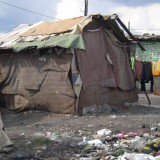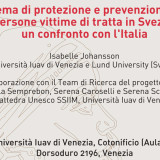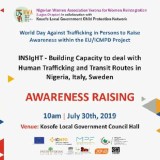When the fortress is no longer useful
For a judicious response to the current wave of migration from Tunisia to Europe, and Italy in the first place, it is crucial to understand what is really happing on the southern shore of the Mediterranean. The riots which led to the downfall of the Governments in Egypt and Tunisia, and the delegitimization of the Libyan and Syrian Governments, as well as that of Yemen, stem primarily from the fact that a generation of young people has taken stage, determined to live a different future than the one they seemed destined to, replicating that of their fathers and grandfathers. As many commentators have stressed, ICTs are largely responsible for the rebellions against the regimes’ rules. They have empowered the new generations to finally express freely their views and their eagerness to build a different society. The youths are no longer keen to accept governments based on authoritarianism, violence, cronyism. Women have taken full part in the jasmine revolution and at Tahrir Square, and no longer accept to remain in the background, even if there is always somebody who tries to thrust them back. These two elements are enough to suggest the magnitude of what has changed and is changing. By running the State as a personal matter the regimes that have ruled until yesterday have stifled the potential that exists in these countries. Instead, the region stretching from Morocco to Syria includes 200 million people waiting only for a more equitable distribution of resources to switch from being a potential to becoming a real market. Once set in motion, the building of a democratic society implying a more equitable distribution of wealth transforms migrating from the only option for one’s own survival and for the survival those who remain, into one among the possible choices. The history of the Polish plumber should have taught us something about the relationship between democracy, development and migration. Egypt, Tunisia, Algeria are indeed destined to become countries of immigration, like Morocco that is already a country of destination for Mauritanians, Senegalese, Malians.
The paradigm “more development for less migration” didn’t work, but neither the “better migration for more development” that the European Union has stressed since the mid 2000s after realising how important are immigrants for its own development has been implemented. Migration policies continue to be centered on the vision of Europe as a fortress besieged by illegal immigrants from whom it is necessary to defend themselves for security reasons and to guarantee public order. As a result, migrants smuggling is flourishing and many regular migrants are forced to move in the area of irregularity thus adding to the undeclared, informal and illegal work. Within a similar frame it is clear that governments look only at preventing the arrival of new migrants. European Mediterranean countries, especially Greece, Italy and Spain, have heavily invested in increasingly strict control measures and in ensuring the cooperation of the countries of the South in the fight against undocumented immigration. The budget of the European Agency for the management of Operational Cooperation at the External Borders (FRONTEX) has been constantly growing from 6 million in 2005 to nearly 90 million in 2009, most of which used for joint patrol operations in the Mediterranean. By signing agreements with regimes at the end of the line, European governments have traded aid in return for the commitment to keep migrants out of Europe and readmitting those who had made it. Thus, migrants have been used as a tool of parallel diplomacy to pursue objectives that have nothing to do with their conditions. The clearest of all the cases is the lift of arms embargo to Libya in 2004, in exchange for the role as the gatekeeper of Europe, no matter if without any respect for the migrants’ human rights, as widely documented.
Now the “wall” painstakingly erected by Europe shows a flaw. Those arriving on the EU southern shores are not asylum seekers but those very undocumented migrants governments have desperately tried to keep out in the last ten years. Numbers are less than gigantic, but governments do not know how and do not want to deal with the situation. Any sign of welcoming reception – though an ostensible duty in countries with firmly asserted civic and democratic traditions as the European ones – demands a substantial reconsideration of the migration policies implemented so far, the reassessment of the security fixation and the tacit admission that the idea of “zero immigration ” is a chimera. Consequently, the situation is at a stalemate: on the one side European governments, particularly the Italian, clearly cannot rebut the migrants fleeing form Tunisia and Libya these days, on the other they are conducting a frantic diplomatic activity to restore the old agreements with the new Governments on he southern shore of the Mediterranean. Yet, these new Governments are now accountable to those democratic movements that brought them to power, and it is unlikely that they would accept to take up again the role of sentinels anti-migrations, or that Europe can put forward this role, driving Governments that were born out of the pressing quest for democracy and freedom as expressed in the past months and weeks, to adopt stances reminiscent of old regimes policies.
Meanwhile, local governments in Europe are called upon to cope with the presence of migrants and respond to their “demand for the city “, i.e. housing, services and public space where to meet, play and pray. A demand that most often does not match with that of the local population and which therefore requires specific responses. Whether they like it or not, local governments are main actors in dealing with globalization and its impacts at the local level. In fact, it is the local governments that are called upon to respond to the current immigration wave. They are asked to set up camps for the asylum seekers and migrants while the national Government is busy in convincing the countries of origin to close their borders. Lampedusa is a glaring example of this, but it is certainly not the only one: Ceuta and Algeciras in Spain, Samos and Rhodes in Greece, and Crotone in Italy can easily be added. But it is also the local population that has to understand that diversity is increasingly the norm, not the anomaly, and to learn how to handle it, laying the ground for an intercultural society and city. Also in this case, the reaction of the inhabitants of Lampedusa to the state of emergency, which in all likelihood could have been avoided, went well beyond what was expected, providing all the support they could to the thousand of people who landed on their shore in few days.
Europe cannot rejoice for the new wind of democracy that blows in the southern Mediterranean countries and at the same time refuse to accept those who, finally freed from decades of looting and oppression by the State, feel entitled to seek a better life, or at least the hope of getting it. In the immediate future Europe has to adopt humanitarian measures to ensure acceptable conditions for those who arrive, while openly and convincingly supporting the process of democratization that is unfolding. It will not be a rapid nor easy process and quite likely fraught with contradictions and setbacks. But Europe has to stand firm behind it, since what seems to be local is strongly associated with other “locals” in the world, and what Europe decides is critical as to the way things will evolve in the southern Mediterranean.
SSIIM Unesco Chair





